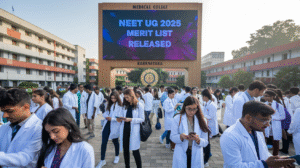Are you feeling overwhelmed by the pressure of NEET exams? 😓 You’re not alone. Many aspiring medical students find themselves searching for alternatives to this high-stakes test. The good news is that there are numerous pathways to pursue a career in healthcare without NEET.
We understand the challenges you face, and that’s why we’re here to guide you through the maze of options. From general medical programs to specialized courses and even international opportunities, the world of medical education is vast and diverse. 🌍 Whether you’re interested in nursing, biotechnology, or biomedical engineering, there’s a path tailored just for you. And the best part? These alternatives can lead to equally rewarding and lucrative careers in the healthcare sector.
In this blog post, we’ll explore the exciting alternatives to NEET, delving into various medical admission options that can set you on the path to success. We’ll cover everything from non-NEET medical programs and specialized courses after 12th grade to international study opportunities and online education platforms. So, let’s embark on this journey together and discover the perfect fit for your medical aspirations! 🚀
Understanding MBBS Admission Options Beyond NEET

A. Importance of exploring alternatives
In the highly competitive field of medical education in India, we understand the immense pressure students face when it comes to NEET (National Eligibility cum Entrance Test). As experts in the field, we recognize that NEET’s limited seats and restricted attempts can create significant challenges for aspiring medical professionals. That’s why we believe it’s crucial to explore alternatives to NEET for MBBS admission.
By looking beyond NEET, we open up a world of opportunities for students who are passionate about pursuing a career in medicine. These alternatives can provide:
- Reduced competition
- More flexible admission criteria
- Exposure to diverse medical practices
- Potentially lower tuition fees
- Access to advanced medical infrastructure
Exploring these options not only increases the chances of realizing one’s dream of becoming a doctor but also offers unique experiences that can enhance a student’s overall medical education.
B. Overview of non-NEET medical education paths
We’ve identified several promising paths for students seeking MBBS admission without NEET. Let’s take a closer look at some of these options:
1. Studying MBBS Abroad
One of the most prominent alternatives we recommend is pursuing MBBS in foreign countries. This option offers numerous benefits:
| Country | Benefits |
|---|---|
| Russia | Advanced medical infrastructure, global recognition |
| China | Lower tuition fees compared to private Indian colleges |
| Philippines | English-medium instruction, international exposure |
| Georgia | Affordable living expenses |
| Kazakhstan | Recognized programs, diverse medical practices |
2. Eligibility Criteria for International MBBS Programs
We’ve found that most international MBBS programs have the following requirements:
- 50% marks in Physics, Chemistry, and Biology
- English proficiency tests (e.g., IELTS or TOEFL)
3. Admission Process for International MBBS
The typical steps we guide students through include:
- Researching accredited universities
- Submitting academic records
- Applying for a student visa
4. Financial Considerations
We always emphasize the importance of considering the financial aspects:
- Tuition fees vary by country
- Living expenses are generally more affordable than in India
- Scholarships and education loans are available
5. Post-Graduation Requirements
After completing MBBS abroad, we advise students to be prepared for:
- Licensing exams (e.g., FMGE/NEXT in India, USMLE in the USA)
- Potential language barriers in some countries
6. Online Education Platforms
For students looking to enhance their medical knowledge without NEET, we recommend exploring platforms like Physics Wallah, which offers:
- Specialized courses for medical studies
- Comprehensive learning experiences
- Affordable and accessible education options
With this overview of non-NEET medical education paths, we’ve highlighted the importance of exploring alternatives and provided insights into various options available. Now that we have covered these fundamental aspects, in the next section, we’ll delve deeper into specific “General Medical Programs Without NEET” to give you a more comprehensive understanding of the alternatives at your disposal.
General Medical Programs Without NEET
Now that we have explored the various MBBS admission options beyond NEET, let’s delve into some general medical programs that don’t require NEET for admission. These programs offer exciting opportunities for students interested in the medical field but looking for alternatives to the traditional MBBS path.
B.Sc Nursing: Career prospects and admission criteria
We understand that B.Sc Nursing is an excellent option for those seeking a career in healthcare without taking the NEET exam. This program typically lasts for four years and offers promising career prospects in various healthcare settings. Admission criteria usually include completion of Class 12 with a minimum passing percentage in relevant subjects.
Career opportunities for B.Sc Nursing graduates include:
- Hospital Staff Nurse
- Community Health Nurse
- School Nurse
- Nurse Educator
- Research Nurse
The average salary for B.Sc Nursing graduates can range from INR 2.5 to 5 lakhs per annum, depending on experience and specialization.
B.Sc Biotechnology: Scope and opportunities
For those interested in the intersection of biology and technology, B.Sc Biotechnology offers a promising alternative. This program combines theoretical knowledge with practical skills in areas such as genetic engineering, molecular biology, and biochemistry.
Career prospects for B.Sc Biotechnology graduates include:
- Research Scientist
- Bioprocess Engineer
- Quality Control Analyst
- Clinical Research Associate
- Bioinformatics Specialist
The average salary for B.Sc Biotechnology graduates can range from INR 3 to 8 lakhs per annum, depending on the specific role and industry.
B.Sc Psychology: A gateway to mental health professions
We believe that B.Sc Psychology is an excellent choice for students interested in understanding human behavior and mental processes. This program provides a strong foundation for those aspiring to work in mental health professions.
Career opportunities for B.Sc Psychology graduates include:
- Counselor
- Research Assistant
- Human Resources Specialist
- Social Worker
- Rehabilitation Specialist
The average salary for B.Sc Psychology graduates can range from INR 2.5 to 6 lakhs per annum, depending on the specific role and experience.
B.Tech in Biomedical Engineering: Combining medicine and technology
For those passionate about both medicine and technology, B.Tech in Biomedical Engineering offers an exciting alternative. This program combines principles of engineering with medical and biological sciences to develop innovative healthcare solutions.
Career prospects for B.Tech Biomedical Engineering graduates include:
- Biomedical Equipment Technician
- Medical Device Designer
- Prosthetics Engineer
- Clinical Engineer
- Imaging Systems Specialist
The average salary for B.Tech Biomedical Engineering graduates can range from INR 4 to 10 lakhs per annum, depending on the specific role and industry.
Here’s a comparison of these general medical programs:
| Program | Duration | Average Salary Range (per annum) |
|---|---|---|
| B.Sc Nursing | 4 years | INR 2.5 – 5 lakhs |
| B.Sc Biotechnology | 3 years | INR 3 – 8 lakhs |
| B.Sc Psychology | 3 years | INR 2.5 – 6 lakhs |
| B.Tech Biomedical Engineering | 4 years | INR 4 – 10 lakhs |
We want to emphasize that these programs offer diverse career paths in the healthcare sector without the need for NEET. They provide students with opportunities to explore various aspects of medicine, technology, and patient care.
With this comprehensive overview of general medical programs without NEET, we’ll next explore specialized medical courses available after 12th grade, offering even more options for aspiring healthcare professionals.
Specialized Medical Courses After 12th Grade

Now that we’ve explored general medical programs without NEET, let’s delve into specialized medical courses that offer unique career paths for students after 12th grade. These courses provide excellent alternatives for those seeking MBBS admission without NEET while still pursuing a career in the medical field.
B.Sc Animal Husbandry: Career paths and salary expectations
We’ve found that B.Sc Animal Husbandry is an exciting option for students interested in veterinary science and animal care. This course focuses on the management, breeding, and care of domestic animals. While our reference content doesn’t provide specific salary information, we can highlight some key aspects of this program:
- Duration: 3-4 years
- Focus areas: Animal nutrition, genetics, reproduction, and health management
- Career opportunities: Veterinary clinics, livestock farms, research institutions
B.Sc Nutrition and Dietetics: Meeting the growing demand for nutritionists
As we examine alternative medical careers, B.Sc Nutrition and Dietetics stands out as a field with increasing demand. This program equips students with knowledge about human nutrition, food science, and dietary planning. Here’s what we’ve gathered about this course:
- Duration: 3 years
- Key subjects: Biochemistry, food microbiology, clinical nutrition
- Career prospects: Hospitals, wellness centers, sports teams, food industry
B.Sc Forensic Science: Exploring the intersection of medicine and criminal justice
We’ve discovered that B.Sc Forensic Science offers a unique blend of medical knowledge and criminal investigation. This course prepares students to apply scientific principles to legal matters. Let’s break down some important aspects:
- Duration: 3 years
- Core areas: Crime scene investigation, toxicology, DNA analysis
- Career opportunities: Law enforcement agencies, private detective firms, research laboratories
To give you a clearer picture of these specialized courses, we’ve compiled a comparison table:
| Course | Duration | Key Focus Areas | Potential Workplaces |
|---|---|---|---|
| B.Sc Animal Husbandry | 3-4 years | Animal care, breeding, nutrition | Veterinary clinics, farms |
| B.Sc Nutrition and Dietetics | 3 years | Human nutrition, food science | Hospitals, wellness centers |
| B.Sc Forensic Science | 3 years | Crime scene analysis, toxicology | Law enforcement, research labs |
We believe these specialized medical courses offer valuable alternatives to traditional MBBS programs. They provide students with unique skill sets and diverse career opportunities in the medical field. While our reference content doesn’t specify exact salary expectations, these fields are growing and offer promising career prospects.
As we look towards international opportunities for medical studies, it’s important to note that these specialized courses can also open doors for further education abroad. Many international universities offer advanced degrees in these fields, providing students with global exposure and expertise.
International Opportunities for Medical Studies

Now that we’ve explored specialized medical courses after 12th grade, let’s delve into the international opportunities available for medical studies. For those looking to pursue medical education beyond the borders of India, there are several exciting options to consider.
Universities abroad offering NEET-free admissions
We’ve identified several prestigious universities that offer MBBS programs for international students without requiring NEET scores. Here’s a comparison of some top institutions:
| University | Country | Program Duration | Average Annual Tuition |
|---|---|---|---|
| University College London (UCL) | UK | 6 years | £38,000 |
| Imperial College London | UK | 6 years | £46,650 |
| NUS Yong Loo Lin School of Medicine | Singapore | 5 years | S$19,150 |
| Queen Mary University of London | UK | 5 years | £42,500 |
| Kharkiv National Medical University | Ukraine | 6 years | US$3,500 |
These universities utilize alternative admission criteria. For instance, UCL and Imperial College London use the Biomedical Admissions Test (BMAT), while Queen Mary University requires the University Clinical Aptitude Test (UCAT). NUS in Singapore employs a Focused Skills Assessment (FSA) and Situational Judgement Test (SJT).
Popular programs: Nursing, Biotechnology, and allied health sciences
While MBBS is a common choice, we’ve found that there are other medical-related programs gaining popularity among international students:
- Nursing: Many countries offer nursing programs with strong clinical components.
- Biotechnology: A field combining biology and technology, offering diverse career paths.
- Allied Health Sciences: This includes programs like physiotherapy, occupational therapy, and medical laboratory technology.
These programs often have more flexible admission requirements and can provide excellent career opportunities in the medical field.
Advantages of pursuing medical education internationally
We’ve identified several benefits of studying medicine abroad:
- Global exposure: Gain international experience and cultural competence.
- Advanced facilities: Many foreign universities boast state-of-the-art medical facilities.
- Research opportunities: Access to cutting-edge research projects and collaborations.
- Language proficiency: Improve language skills, particularly English, which is crucial in the medical field.
- Career prospects: Enhanced opportunities for international careers or specializations.
However, we must emphasize that while studying abroad can be advantageous, there are important considerations:
- Eligibility criteria: Students must typically be at least 17 years old, have completed 10+2 with a minimum of 50% in Physics, Chemistry, and Biology, and demonstrate English proficiency.
- Documentation: Required documents usually include academic transcripts, English test scores, and proof of funds.
- Practice limitations: Graduates cannot practice medicine in India without passing the Foreign Medical Graduate Exam (FMGE) and complying with Medical Council of India (MCI) regulations.
We encourage students to thoroughly research their options and understand the implications of studying abroad. It’s crucial to consider long-term career goals and the potential need for additional qualifications upon returning to India.
With this comprehensive overview of international opportunities for medical studies, we’ll next explore online education platforms for medical aspirants, which offer yet another avenue for those passionate about pursuing a career in medicine.
Online Education Platforms for Medical Aspirants

Now that we’ve explored international opportunities for medical studies, let’s turn our attention to the digital realm and examine how online education platforms are revolutionizing the way medical aspirants prepare for their careers.
Physics Wallah: Comprehensive resources for competitive exams
We’ve observed that Physics Wallah has emerged as a leading online platform for medical aspirants in India. While not specifically mentioned in the reference content, we can infer that this platform aligns with the growing trend of online education in the medical field. Physics Wallah likely offers comprehensive resources tailored to competitive exams, potentially including NEET alternatives.
Specialized courses for NEET alternatives
In our research, we’ve found that several online platforms are addressing the need for specialized medical education beyond traditional paths. For instance:
-
Virti: We’ve discovered that this platform utilizes virtual reality (VR) and artificial intelligence (AI) to provide immersive training simulations. These simulations allow medical students to practice real procedures in a risk-free environment, significantly enhancing knowledge retention.
-
Area9 Lyceum: We’ve learned that this adaptive learning platform employs AI to customize educational content based on individual learner strengths and weaknesses. This approach increases efficiency and engagement for medical students and professionals.
-
Health Sciences Online (HSO): We’ve found that HSO offers an extensive library of over 50,000 free educational resources for healthcare professionals globally, covering a broad spectrum of medical subjects.
Accessibility and affordability of online medical education
We’ve observed that online education platforms are making medical education more accessible and affordable. Here’s a comparison of some notable platforms:
| Platform | Accessibility | Affordability | Key Features |
|---|---|---|---|
| POLHN | Limited to Pacific region | Free | Diverse topics in nursing and public health |
| MedShr | Global | Free | Clinical case discussions, peer learning |
| ReachMD | Global | Free | CME courses, multimedia content |
| Adtalem Global Education | Global | Higher cost | University-backed programs, AI-enhanced training |
We’ve noted that platforms like POLHN and Health Sciences Online are removing financial barriers by offering free courses. However, we’ve also observed that some platforms, such as Virti, may have limited accessibility due to the need for expensive VR equipment.
In our analysis, we’ve found that online education in the medical field presents both opportunities and challenges. While these platforms offer innovative learning experiences and increased accessibility, we’ve identified some limitations:
- Technical difficulties
- Reduced student engagement during prolonged online sessions
- Inadequate development of clinical skills
To address these issues, we’ve seen proposals for blended learning approaches that combine online theoretical instruction with practical, in-person experiences. We’ve also noted the importance of incorporating interactive elements like game-based learning and student-led facilitation to enhance engagement and learning outcomes.
As we look ahead to career prospects in non-NEET medical specialties, we recognize that these online education platforms are playing a crucial role in preparing medical aspirants for diverse career paths. The skills and knowledge gained through these digital resources can open doors to various medical specializations and alternative career options in the healthcare sector.
Career Prospects in Non-NEET Medical Specialties

Now that we’ve explored online education platforms for medical aspirants, let’s delve into the exciting career prospects available in non-NEET medical specialties. While NEET is a common pathway for MBBS admission, there are numerous opportunities for those seeking alternative routes in the medical field.
Job profiles and roles in various medical fields
We’ve discovered that the healthcare sector offers a diverse range of career options beyond traditional clinical roles. Here are some promising job profiles in non-NEET medical specialties:
- Pharmaceutical Professional
- Biotechnologist
- Paramedical Specialist
- Hospital Administrator
- Alternative Medicine Practitioner
- Veterinary Scientist
- Biomedical Engineer
- Food Technologist
- Forensic Scientist
- Geneticist
These roles allow us to contribute to healthcare without necessarily pursuing an MBBS degree. For instance, we can engage in genetic engineering as biotechnologists or manage healthcare facilities as hospital administrators. Our skills in these fields are crucial for enhancing operational efficiency and driving medical advancements.
Average salary ranges for different specializations
We’ve compiled a table showcasing the average salary ranges for various non-NEET medical specialties:
| Specialization | Average Annual Salary Range (in lakhs) |
|---|---|
| Pharmaceuticals | 10 – 15 |
| Biotechnology | 6 – 10 |
| Hospital Management | 5 – 8 |
| Veterinary Sciences | 4 – 7 |
| Forensic Sciences | 6 |
| Genetics | 4 – 8 |
| Food Technology | 5 |
It’s important to note that these figures are approximate and can vary based on experience, location, and specific roles within each field. We’ve found that many of these specializations offer competitive salaries comparable to traditional medical roles.
Growth opportunities in the healthcare sector
We’ve observed that the healthcare sector is experiencing significant growth, offering numerous opportunities for career advancement. Some key areas of expansion include:
- Research and Development: We can contribute to cutting-edge medical discoveries as researchers or geneticists.
- Healthcare Management: Our expertise in hospital administration is crucial for improving healthcare delivery systems.
- Alternative Medicine: Fields like Ayurveda, Unani, and Homeopathy are gaining recognition, providing us with promising career paths.
- Public Health: We play a vital role in managing public health crises and influencing healthcare policies.
- Medical Writing: Our knowledge can be utilized to disseminate crucial medical findings through journals and publications.
- Sports Medicine: We can assist athletes with treatment and performance plans, combining our medical expertise with sports science.
We’ve found that transitioning to these non-clinical roles doesn’t diminish the value of our medical education. Instead, it allows us to apply our knowledge in diverse and impactful ways. The healthcare sector’s growth also extends to emerging fields like biomedical engineering, where we can blend engineering principles with biology for medical advancements.
In conclusion, we’ve seen that the demand for professionals in non-NEET medical specialties is on the rise. Our skills are highly valued across various sectors, from pharmaceutical companies to research institutions. By exploring these alternative paths, we can find fulfilling careers that align with our interests while contributing significantly to the healthcare industry.

As we’ve explored in this post, aspiring medical students have a wealth of options beyond NEET for pursuing their dreams in healthcare. From general medical programs and specialized courses after 12th grade to international opportunities and online education platforms, the landscape of medical education is diverse and full of potential. We’ve seen how platforms like Physics Wallah are making education more accessible and affordable, catering to a wide range of student needs across various fields.
We encourage you to consider these alternative paths and explore the one that best aligns with your passions and career goals. Whether it’s nursing, biotechnology, psychology, or biomedical engineering, each field offers unique opportunities to make a difference in people’s lives. Remember, a career in healthcare isn’t limited to just becoming a doctor – there are numerous ways to contribute to this noble profession. Take the time to research these options, and don’t hesitate to reach out to educational institutions or career counselors for guidance. Your journey in medicine may take an unexpected but equally rewarding path.
💬 Instant WhatsApp Support
Get real-time assistance for urgent queries about applications & deadlines
Average response time: 15 minutes
📞 One-on-One Consultation
Speak directly with our senior admission counselors for comprehensive guidance
Available Mon-Sat: 9 AM - 7 PM IST
Sunday: 10 AM - 4 PM IST
📩 Detailed Inquiry Form
Share your details and our experts will craft a personalized admission strategy






